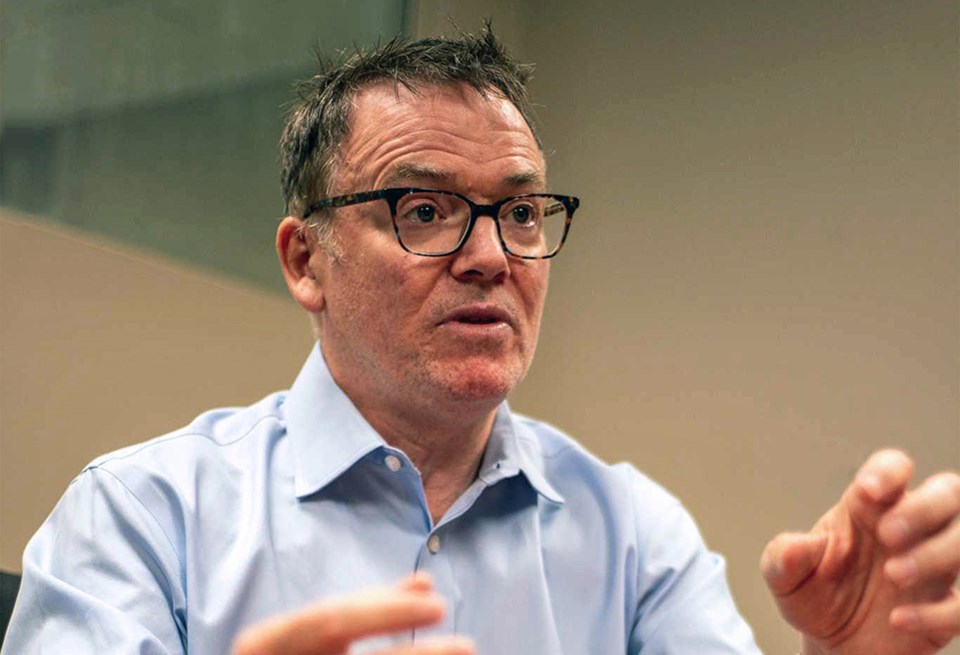What is BC United? It’s a question that confused voters asked fairly frequently on the doorstep during B.C.’s two provincial byelections. And it’s a larger philosophical debate that the former BC Liberal Party will be having this summer, as it sifts through the rubble of Saturday’s disastrous byelection results.
As expected, BC NDP candidates easily won in Langford and Vancouver-Mount Pleasant. Ravi Parmar and Joan Phillip are the new MLAs-elect, respectively. That outcome was never really in doubt. What most people were watching to see was how the other parties did, outside of the NDP.
BC United was hammered by voters, especially in Langford-Juan de Fuca, where the party’s share of the vote dropped more than six percentage points to plummet to fourth place behind the Greens and Conservatives.
The United/Liberals have lost 22 percentage points of the popular vote in the last four elections. Its eight per cent showing in 2023 was a far cry from almost 31 per cent support in 2013.
It was the worst of all possible outcomes for leader Kevin Falcon — a mixture of brand confusion, a right-wing bleed to the Conservatives, and voter apathy over its policies.
Falcon is in line for an uncomfortable summer, as members of his caucus question whether the party is on the right trajectory.
BC United went heavy on crime and addictions in the byelections, zeroing in on public drug use in playgrounds and parks in the suburbs of Langford and Vancouver’s infamous Downtown Eastside. These are legitimate issues of concern, rank high in public opinion polling, and left ample room for United candidates to criticize the NDP. But they didn’t appear to move the dial in Vancouver, where candidate Jackie Lee ran a lacklustre campaign that didn’t much advance the Liberal share of the vote from 2020.
In Langford-Juan de Fuca, the biggest story was Conservative candidate Mike Harris, who shot up to second place in the byelection, with almost 20 per cent of the vote (still well shy of Parmar’s 53 per cent).
Harris, a realtor, ran a pragmatic campaign about low taxes, local light rail and economic development. Unlike his Conservative counterpart in Vancouver, who ran a repugnant anti-trans campaign that barely registered with voters, Harris largely steered clear of culture war issues in favour of a traditional conservative platform. That he could make such strong inroads in a fast-growing suburb of Victoria with a fiscal conservative message, bodes well for the party in the future.
The rise of the Conservatives in Langford will give Falcon some sleepless nights. He took a risk in ejecting MLA John Rustad (now BC Conservative leader) from his caucus last year over Rustad’s controversial opinions about climate change. And Falcon has charted a course for BC United that is moderate in its economic and social policies, calculating that it’s the best course to win vote-rich urban ridings.
Whether Rustad is a strategic genius chipping away at the right flank of BC United, or simply in a lucky position for the spillover effect of rising voter support for the federal Conservative Party of Canada (and anger over federal Liberal leader Justin Trudeau) is unclear.
The BC Conservatives did not have a platform, per se, in the byelections. Rustad spent most of his time fighting against what he called “woke” elites in Vancouver who disagreed with his candidate’s views on transgendered people. It’s quite possible Harris’s success in Langford had little to do with the party, its leader or its policies. Nonetheless, Rustad and the BC Conservatives will take credit. And that will kick-start rumblings of concern about centre-right vote-splitting within BC United.
For the BC Greens, the byelection was disappointing.
The party had hoped to grow its share of the vote in Langford-Juan de Fuca with a heavy focus on the doctor shortage and healthcare issues, and by tapping into candidate Camille Currie’s advocacy group Health Care Matters. The Greens largely held their share of the vote in Langford. But they were
looking to improve, especially with leader Sonia Furstenau taking on part of the riding in next year’s boundary redistribution.
In Vancouver-Mount Pleasant, the Greens collapsed. Candidate Wendy Hayko dropped almost ten percentage points. The party went from second place in 2020 to third this time around. The relevancy of the Greens in Metro Vancouver remains an ongoing issue of concern.
BC New Democrats, meanwhile, accomplished their goal in the byelections: Hold the two ridings with a margin of victory that didn’t look like support was dwindling for the NDP government after six years in power. At the very least, the results will staunch any suggestion that the NDP brand has weakened with the departure of Horgan and the transition to Premier David Eby.
As BC United digests the byelections, it would be wise to avoid panic.
In the long term, it still makes a good amount of sense for the party to have changed its name away from any linkage with the word “liberal” at a time when the public is turning against Trudeau’s federal Liberal government.
It’s only been three months since the name change. It could take BC United right up until the 2024 election to raise enough brand profile to cut through the fog of indifference that surrounds ordinary voters.
But still, there’s no denying the results are a wakeup call and a swift kick in the rear end for the party. It’s a reminder: BC United has a lot of work to do before it is in any type of position to mount a credible challenge to the BC NDP.
Rob Shaw has spent more than 15 years covering B.C. politics, now reporting for CHEK News and writing for Glacier Media. He is the co-author of the national bestselling book A Matter of Confidence, host of the weekly podcast Political Capital, and a regular guest on CBC Radio.



